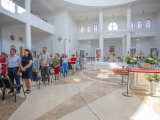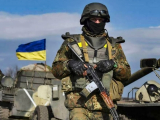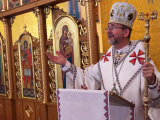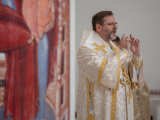Myroslav Marynovych on papal encyclicals: Propositions received, but not learned
Friday, 18 November 2011, 19:58 The Catholic Church for a hundred of years has published encyclicals regarding the social aspect of life. However, the encyclicals have not been duly appreciated by the Ukrainian society. Often the encyclicals live their own life and the world its own one, said vice Rector Myroslav Marynovych on November 15 during a presentation of social encyclicals at UCU – Deus Caritas Est (God is love) by Pope Benedict XVI (2005), Solicitudo Rei Socialis (Care for social concerns) by Pope John Paul (1987), Popolorum Progressio (Development of nations), by Pope Paul VI (1967), and Caritas in Veritate (Charity in truth) by Pope Benedict XVI (2009).The Catholic Church for a hundred of years has published encyclicals regarding the social aspect of life. However, the encyclicals have not been duly appreciated by the Ukrainian society. Often the encyclicals live their own life and the world its own one, said vice Rector Myroslav Marynovych on November 15 during a presentation of social encyclicals at UCU – Deus Caritas Est (God is love) by Pope Benedict XVI (2005), Solicitudo Rei Socialis (Care for social concerns) by Pope John Paul (1987), Popolorum Progressio (Development of nations), by Pope Paul VI (1967), and Caritas in Veritate (Charity in truth) by Pope Benedict XVI (2009).
The event was organized by the committee of UGCC “Justice and Peace” and the Institute of Religion and Society of UCU. According to Myroslav Marynovych, reading the papal encyclicals requires cooperation – linking eternal truths to everyday life. “In Ukraine we think of models of social development, ways of overcoming the crisis. In these encyclicals there are such proposals, but they are not learned. This opinion I can illustrate with the following example. Back in 1967 in Popolorum Progressio, Pope Paul VI indicates that the main causes of underdevelopment are intangible in nature. The reasons are several – underdeveloped will, which often neglects solidarity, and the lack of solidarity generates a lack of progress; thinking that is not always able to direct its desires; as well as lack of brotherhood between people and between nations. Is it not taken from the Ukrainian reality?” sums up the public figure. In 2009, Pope Benedict XVI in Caritas in Veritate writes: “As society becomes ever more globalized, it makes us neighbours but does not make us brothers.” Myroslav Marynovych explains: “Here the pope indicates unexpected chances of the crisis, which obliges to rethink our way, to find new forms of engagement, adopt new rules. The crisis is a chance if we can see it.” “The four presented encyclicals bring together topics of development and progress,” believes professor of social teaching of the church, attorney Andrii Kostiuk. “Actually, papal documents are an example of progress in specific areas of theology, social teaching. However, they are an example of stability and focus on certain principles. Emergence from the crisis and the way toward progress are possible by replacing the social perception of the other – not as a competitor but as a brother, for whom we can do something selfless. The economy and social relations should be a place for a gift. But we cannot force anyone to do this, it must be a free act of the individual.” UCU Press Service
We can imagine what the prayer of the prisoners in the Russian torture centers in the Ukrainian Kharkiv region was like – Head of the UGCC on the 206th day of the war 17 September
A vast cemetery, a mass burial, was found near the city of Izyum, in which more than 400 innocently killed and tortured people have already been...
-
 Глава УГКЦ у 158-й день війни: «Нехай Господь прийме з уст нашої Церкви псалми та моління за всіх тих, які особливо просять нашої молитви»
Глава УГКЦ у 158-й день війни: «Нехай Господь прийме з уст нашої Церкви псалми та моління за всіх тих, які особливо просять нашої молитви»
-
 «Сила, яка походить із вірності Христові, є стержнем, який ніхто не може зламати», – Блаженніший Святослав
«Сила, яка походить із вірності Христові, є стержнем, який ніхто не може зламати», – Блаженніший Святослав
-
 Глава УГКЦ у 157-й день війни: «В ім’я Боже ми засуджуємо звірства в Оленівці і світ повинен це засудити як особливий вияв дикості й жорстокості»
Глава УГКЦ у 157-й день війни: «В ім’я Боже ми засуджуємо звірства в Оленівці і світ повинен це засудити як особливий вияв дикості й жорстокості»
-
 «Боже, почуй наш плач і поспіши нам на допомогу і порятунок!», – Глава УГКЦ у 156-й день війни
«Боже, почуй наш плач і поспіши нам на допомогу і порятунок!», – Глава УГКЦ у 156-й день війни
-
 «Бог йому дав серце і душу українського народу»: відбулася щорічна проща до Прилбичів з нагоди уродин митрополита Андрея Шептицького
«Бог йому дав серце і душу українського народу»: відбулася щорічна проща до Прилбичів з нагоди уродин митрополита Андрея Шептицького
-
 Глава УГКЦ: «Я горджуся українськими патріотами, які без найменшої краплі ненависті готові захищати своє»
Глава УГКЦ: «Я горджуся українськими патріотами, які без найменшої краплі ненависті готові захищати своє»
-
 Блаженніший Святослав закликав українську молодь скласти присягу на вірність Христові
Блаженніший Святослав закликав українську молодь скласти присягу на вірність Христові
-
 Глава УГКЦ у 155-й день війни: «Помолімося, щоб не втратити скарбу віри князя Володимира»
Глава УГКЦ у 155-й день війни: «Помолімося, щоб не втратити скарбу віри князя Володимира»
-
 Блаженніший Святослав у День державності України: «Наша Держава – це для нас питання життя або смерті»
Блаженніший Святослав у День державності України: «Наша Держава – це для нас питання життя або смерті»
-
 Глава УГКЦ у 154-й день війни: «Нехай Господь Бог прийме у свої вічні обійми журналістів, які віддали за правду своє життя в Україні»
Глава УГКЦ у 154-й день війни: «Нехай Господь Бог прийме у свої вічні обійми журналістів, які віддали за правду своє життя в Україні»
-
 Глава УГКЦ у 153-й день війни: «Принесімо наш біль перед Боже обличчя і будьмо певні, що Він нас вислухає»
Глава УГКЦ у 153-й день війни: «Принесімо наш біль перед Боже обличчя і будьмо певні, що Він нас вислухає»
-
 Глава УГКЦ у 152-й день війни: «Помолімся молитву заступництва за наших воїнів»
Глава УГКЦ у 152-й день війни: «Помолімся молитву заступництва за наших воїнів»
-
 «Віруюча людина не може бути байдужою, коли бачить страждання іншої людини», – владика Богдан Дзюрах
«Віруюча людина не може бути байдужою, коли бачить страждання іншої людини», – владика Богдан Дзюрах
-
 «Серед нашого страждання творімо простір для прояву Божої всемогутності», – Глава УГКЦ у 6-ту неділю після П’ятдесятниці
«Серед нашого страждання творімо простір для прояву Божої всемогутності», – Глава УГКЦ у 6-ту неділю після П’ятдесятниці
-
 Глава УГКЦ у 151-й день війни: «Російське віроломство ми перемагаємо силою любові до нашої Батьківщини»
Глава УГКЦ у 151-й день війни: «Російське віроломство ми перемагаємо силою любові до нашої Батьківщини»

